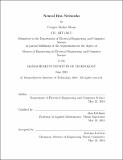Neural bus networks
Author(s)
Sloan, Cooper Stokes
DownloadFull printable version (2.084Mb)
Other Contributors
Massachusetts Institute of Technology. Department of Electrical Engineering and Computer Science.
Advisor
Alan Edelman.
Terms of use
Metadata
Show full item recordAbstract
Bus schedules are unreliable, leaving passengers waiting and increasing commute times. This problem can be solved by modeling the traffic network, and delivering predicted arrival times to passengers. Research attempts to model traffic networks use historical, statistical and learning based models, with learning based models achieving the best results. This research compares several neural network architectures trained on historical data from Boston buses. Three models are trained: multilayer perceptron, convolutional neural network and recurrent neural network. Recurrent neural networks show the best performance when compared to feed forward models. This indicates that neural time series models are effective at modeling bus networks. The large amount of data available for training bus network models and the effectiveness of large neural networks at modeling this data show that great progress can be made in improving commutes for passengers.
Description
Thesis: M. Eng., Massachusetts Institute of Technology, Department of Electrical Engineering and Computer Science, 2018. This electronic version was submitted by the student author. The certified thesis is available in the Institute Archives and Special Collections. Cataloged from student-submitted PDF version of thesis. Includes bibliographical references (pages 65-68).
Date issued
2018Department
Massachusetts Institute of Technology. Department of Electrical Engineering and Computer SciencePublisher
Massachusetts Institute of Technology
Keywords
Electrical Engineering and Computer Science.